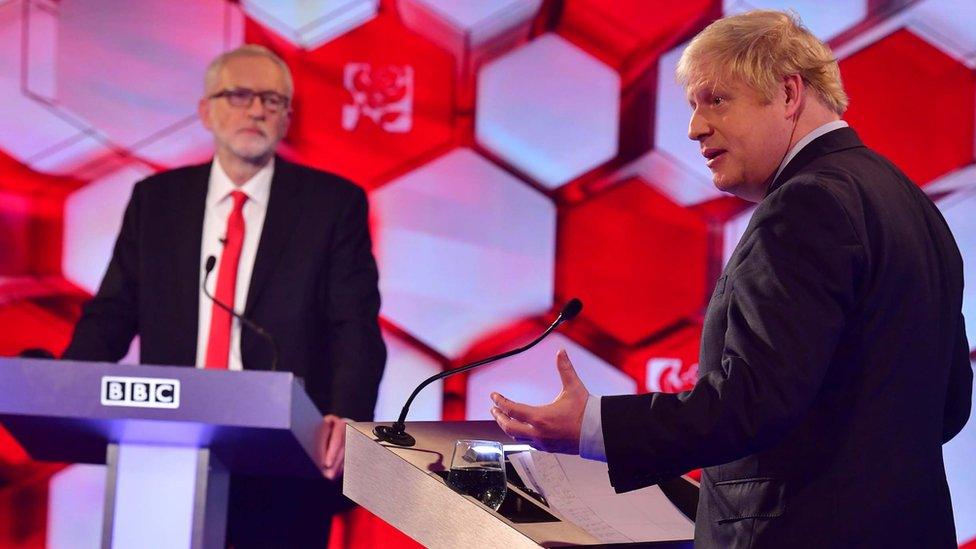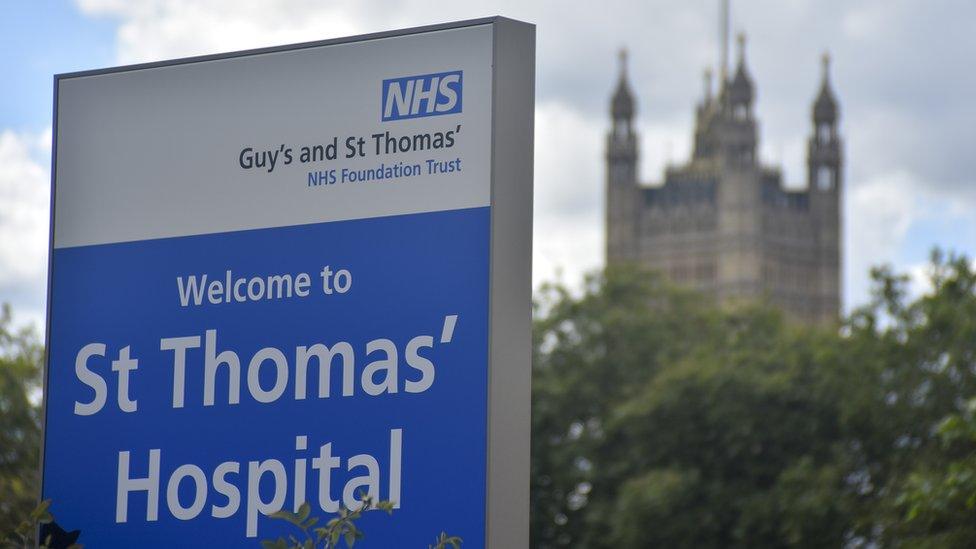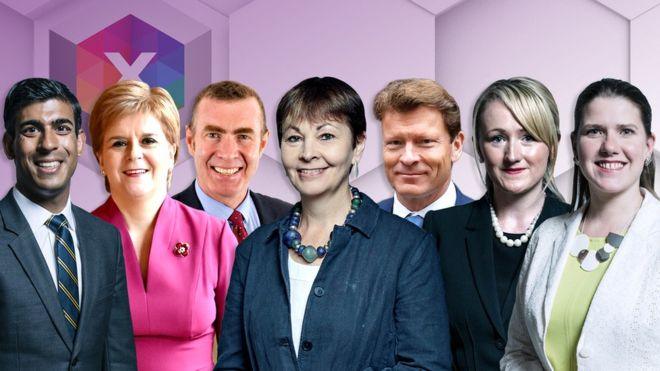General election 2019: Corbyn and Johnson TV debate fact-checked
- Published

Boris Johnson and Jeremy Corbyn have faced off in a head-to-head debate – the last time they are scheduled to meet before election day.
BBC Reality Check looked at their claims during the hour-long debate.
Boris Johnson said: We will "put in 50,000 more nurses" and "build 40 new" hospitals
Reality Check: Boris Johnson talked about his plans for 50,000 more nurses in the NHS in England by the end of the next parliament (ie five years).
Of these, 31,500 would be new nurses (19,000 newly-trained recruits and 12,500 overseas recruits). The remaining 18,500 would be existing nurses persuaded not to quit, or to come back.
We've previously looked in more depth at how realistic this goal is.
The Conservatives also say they will build and fund 40 hospital projects over 10 years - this has been repeatedly questioned in the campaign.

The party's manifesto says they are proud "to have begun work on building 40 new hospitals across the country".
They all have one thing in common - there is no building work happening as yet.
There will be £2.7bn over five years for the first six hospitals. For the remaining 34 projects, just £100m is available to develop business cases.
Jeremy Corbyn said: "There are now four million children living in poverty in our country"
Reality Check: One of the most commonly used measures of estimating children in poverty is using the Households Below Average Income (HBAI) statistics, external.
It estimates how many children live in UK households which earn 60% less than the median income.
There are two different ways it goes about doing this.
The relative low income figure is used by think tanks like the Resolution Foundation, and gives us an estimate of 4.1 million in 2017-18, or about 30% of children.
The Conservatives prefer to use the "absolute" figure, which is useful in comparing one year with another. Measured this way, the estimate would be 3.7 million children, or about 26%.
Boris Johnson said: Labour would "put up spending to £1.2 trillion"
Reality Check: Labour's spending plans are nowhere near £1.2tn a year.
That's the Conservatives' estimate of the extra spending Labour would make during the whole of the next parliament (ie five years).
The Conservatives first made this costing of Labour's plans before either party's manifesto was published. When Labour's manifesto was published, some items that the Conservatives had costed were not in it.
But the Tories repeated the analysis and reached the same figure of an increase in government spending of £1.2tn over the course of the parliament.
That translates to Labour spending an extra £240bn a year, but the independent Institute for Fiscal Studies costed it at £180bn extra a year by the year 2023-4.
Also, the Conservatives' analysis makes a number of questionable assumptions - including that a Labour government reaches full-speed spending on its first day in office, instead of building up to it over five years.
It prices Labour's nationalisations at £255bn. This is even more costly than the price tag suggested in a hotly contested analysis by employers' organisation the CBI (£196bn).
It says the four-day week will cost £85bn during the parliament - when Labour have set a four-day week as an ambition over ten years.
Jeremy Corbyn said: Labour was "the only party that's produced a fully costed manifesto with a grey book that adds up to every piece of expenditure we want".
Reality Check: Labour's manifesto said that the party's day-to-day spending commitments would be matched by raising taxes. Their investment spending would be covered by borrowing.
But, a few days after the manifesto was published, Labour made a further spending pledge - a £58bn compensation package to women who lost out to changes in the state pension.
On Brexit, Boris Johnson said: "With the deal that we have... we can do such things as... ban the live export of animals, we can cut VAT on tampons."
Reality Check: It is correct to say that the UK would be able to ban live animal exports after it leaves the EU, and the transition period ends.
Under EU single market rules, no member state can ban live animal exports.
The EU does put a number of animal welfare restrictions on exporting live animals. It is an offence to transport them in a way likely to cause injury of undue suffering. Animals have to be provided with adequate space as well as food, water and rest.
The Conservative manifesto pledged to abolish VAT on sanitary products, which is currently 5%. This would be possible after the transition, when the UK will not bound by the EU laws which currently do not allow that tax to fall below 5%.
The EU is also in the process of changing EU law so that VAT on sanitary products can be reduced to zero, but this will not take effect until 2022 at the earliest, external.
Jeremy Corbyn said: "Our tax proposals for corporation tax would be to raise it to 26%... which would be lower than it was in 2010, lower than it is in France, lower than it is in the USA"
Reality Check: Jeremy Corbyn defended Labour's plans to raise corporation tax (that's the tax companies pay on their profits).
Mr Corbyn is right that it would be lower than the rate in 2010-11, when it stood at 28%. When it comes to standard rates of corporation tax, according to figures from the OECD, France currently has a rate of 31%, but the United States has a rate of 21% (although individual states levy extra taxes on top).



- Published29 November 2019
